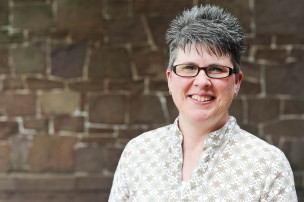Colucci's new job entails ensuring that the University is in compliance with all government equity policies.
In June 2014, Debbie Colucci began working as the University’s Equity Compliance Director and Deputy Title IX Coordinator. The position is new to the University, though Colucci isn’t: she previously worked at the University as Assistant Director of Residential Life between 1997 and 2000.
Vice President for Equity and Inclusion/Title IX Officer Antonio Farias described the rigorous search that allowed the University to find a candidate of Colucci’s caliber.
“We conducted a national search that brought a wide spectrum of talent and after a thorough campus-wide screening that included students, staff, and faculty, it was determined that Debbie was the best qualified candidate,” Farias wrote in an email to The Argus.
Farias praised Colucci’s knowledge of equity and inclusion and expressed his delight at her hiring.
“What made her stand out was an exceptional level of experience in facilitating equity and inclusion workshops as well as her Title IX and Title VII experience which are vital to her role,” Farias wrote.
President Michael Roth added to Farias’ praise and spoke to how Colucci will contribute to the University’s ability to respond to sexual assault.
“[Colucci] has a lot of experience on these issues, and I think she will add to our capacity to deal with incidents when they arise,” Roth said.
Colucci described her new role as the Equity Compliance Director and what her duties will entail.
“My role is to look specifically at equity compliance, and by that we’re looking at things like affirmative action, hiring practice, and discrimination at all levels: faculty, staff, and students,” Colucci said. “I’m very big at looking at respect as the lens [through which] we talk about diversity, equity, and inclusion: finding ways to help people be more respectful of each other, of the community.”
As Deputy Title IX Coordinator, Colucci will work with Farias to make sure the University is in compliance with federal government standards and legislation. However, Colucci emphasized that her job extends beyond the policies the government imposes on the University.
“I work with [Farias] to make sure that we are not only in compliance with the changes and different statutes, but that we’re not just doing it because lawmakers say this is what you should be doing, but that we understand that for Wesleyan to be a respectful community means that we have people who treat each other well [regarding] sexual harassment, sexual assault, and other misconduct,” Colucci said.
Colucci recognizes that most people think of Title IX only as it pertains to women and athletics. She also spoke about the new issues that are coming to light under provision, which she plans to address during her time at the University.
The Title IX Information website clearly outlines the breadth of issues to which Title IX pertains.
“Sexual harassment in education includes any unwanted and unwelcome sexual behavior that significantly interferes with a student’s access to educational opportunities,” reads the website. “The Supreme Court has confirmed that schools have an obligation under Title IX to prevent and address harassment against students, regardless of whether the harassment is perpetrated by peers, teachers, or other school officials.”
Farias detailed why he thought Colucci would be a valuable asset in ensuring the University is in compliance with Title IX.
“The nuances of the various laws (Title IV, VII, IX, ADA, etc) require an exemplary and empathic individual who is able to fully utilize the learning environment that is the core of the university, to help young human beings grow out of their comfort zones and Debbie is a key [to] our office’s strategy of creating a community of inclusion that is based on equity and creates a thriving educational environment,” Farias wrote.
Colucci discussed one of the projects that she is currently working on for the University: the compilation of a climate survey detailing the overall climate on campus in terms of safety, ways of improvement, and more. The survey will most likely be released in 2015.
“We’re teaming up with other colleges to figure out how to do that in a way that we get really good information that we can then go back to students who are interested and faculty and staff and say, ‘This is what we found out, how are we going to move forward?’,” Colucci said. “I really look at my job not to come in and say, ‘We’re going to do this, this, and this,’ but to hear people out and to listen and see where we want to go as an organization.”
As the debate about the presence and actions of Greek life on campus continues, Colucci added her opinion to the conversation, discussing how there is not a quick and easy solution.
“I think it would be shortsighted to say do away with any pocket [of campus life] because it’s still going to exist at the end of the [day],” Colucci said. “I think we need to talk, I think we need to have more and more conversations and really stay focused on what is best for Wesleyan, what helps us accomplish our mission, what helps us to be great at what we’re great at, and then go from there.”
